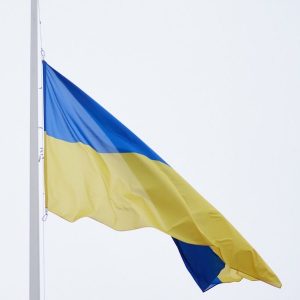
On Monday, the State Gemological Centre of Ukraine wrote to the chair of the Kimberley Process (KP), asking it to redefine conflict diamonds in a way that would likely shut out Russian diamonds, in response to that country’s ongoing war against Ukraine.
In its letter to the certification scheme’s chair, Jacob Thamage of Botswana, Ukraine asked the KP to change its current definition of conflict diamonds to include diamonds “where violence is used” in their mining and excavation, “even if they are not associated with any rebel movements, but there are armed conflicts in violation of international humanitarian law, [the] funding [of] which involve diamonds mined by the aggressor country.”
This seems a reference to the two main Russian diamond miners—Alrosa and Grib—which are both partly or wholly owned by the Russian government.
The new language would give the KP a reason to suspend Russia from the certification scheme, says Vladimir Tatarintsev, the KP’s focal point for Ukraine, and would largely ban those diamonds from world markets.
“We ask you, as the KP Chair, to protect the main goal of the KP—the promotion of peace, safety and sustainable development,” the letter concluded.
Currently, the Kimberley Process’s definition of conflict diamonds is limited to diamonds that fund conflicts instigated by rebel movements against a legitimate government.
While there have been various—unsuccessful—attempts to expand the current KP definition to include human rights abuses associated with diamond excavation, the proposed language would represent a dramatic expansion of the KP’s charter.
Like others, Tatarintsev admits that, given that changes in the KP require absolute consensus among the 82 participating governments, he has “big doubts that KP [will be] able to carry out the redefinition of the term ‘conflict’ diamonds. In any case, we are trying to do everything in our power to increase pressure on Russia.”
His letter also asks that Russia be removed as the head of different KP committees and working bodies. It notes that a KP administrative decision says that the presidency of different bodies should be suspended if the country is under U.N. sanctions, and Russia’s invasion has been condemned by a resolution in the United Nations General Assembly.
Reports have said that, post-invasion, U.S. and EU representatives have “boycotted” KP meetings run by Russian representatives.
Tatarintsev says that the KP representatives from the United States and the EU have been supportive of some of Ukraine’s requests, as has the Kimberley Process Civil Society Coalition, which earlier this year called for a meeting on the issue.
The U.S., EU, and Russian representatives to the Kimberley Process did not answer requests for comment by the time of publication.
Top: The Ukrainian flag (photo courtesy of the government of Ukraine)
- Subscribe to the JCK News Daily
- Subscribe to the JCK Special Report
- Follow JCK on Instagram: @jckmagazine
- Follow JCK on X: @jckmagazine
- Follow JCK on Facebook: @jckmagazine






